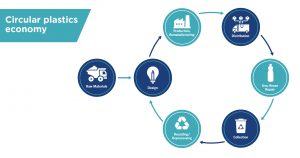1. Plastics: a changing landscape
Increasing awareness of the environmental impacts caused by human consumption has led to increased societal pressure on governments and industry to modify practices to lessen their impact on the environment. One area this has occurred which is of particular concern to downstream market participants, is single use plastics. According to the United Nations, only 9% of all plastic waste ever produced has been recycled, about 12% has been incinerated, with the remaining 79% ending up in landfill or the environment. Pressure has therefore been mounting to ‘close the loop’ on plastics, meaning finding a sustainable way to either recycle or dispose of them.
Unfortunately, there is no simple solution to the issue as plastics remain an indispensable product and current recycling practices remain inadequate to deal with it with recycled products being of a lesser quality (resulting in what is referred to as ‘downcycling’). Furthermore with China’s ban in 2018 on accepting foreign waste for recycling, the lack of domestic recycling capacity in many countries was exposed.
Adding to the complexity of the issue has been the COVID-19 pandemic which has seen a huge demand for personal protective equipment, often made from single use plastics which has again increased demand for such plastics.
This note outlines some of the key industry and regulatory trends we are seeing in the market, along with the key opportunities we see for market participants.
2. Industry trends and opportunities
[accordions id="1164"]
3. The regulatory environment
Concomitant with consumer and manufacturer pressure to create a more sustainable plastics industry has been the pressure created by increased governmental regulation concerning the manufacture and use of plastics in different jurisdictions. Despite efforts to create uniform action by bodies such as the G7 under Canada’s presidency and the United Nations through its 2018 Report into single-use plastics, generally, measures have been implemented on a jurisdiction by jurisdiction basis. There is a general trend across the globe to tackle the plastics problem with over 127 countries having introduced some form of restrictions on plastics. Generally, the measures fall into the following categories:
- outright bans on certain categories of plastic products;
- taxes on consumers of certain plastic products (e.g. bags); and
- requirements on producers to fund activities such as disposal, waste treatment or awareness campaigns.
The patchwork approach by different jurisdictions makes it difficult to form a uniform strategy, however the common element is that most jurisdictions are aiming to significantly reduce the use of such plastic products.
[accordions id="1168"]
4. How HSF can assist
HSF is already assisting a number of clients with their transition to decarbonise and reduce their plastics exposure, through many of the measures outlined above, such as through strategic mergers, acquisitions and divestments, through entering into joint ventures for research and innovation, and through navigating the complex and multitudinous regulatory frameworks in different jurisdictions. We have experts on the ground across the world, to assist clients in navigating complex regulatory environments and identifying and exploiting opportunities.
Disclaimer
The articles published on this website, current at the dates of publication set out above, are for reference purposes only. They do not constitute legal advice and should not be relied upon as such. Specific legal advice about your specific circumstances should always be sought separately before taking any action.

